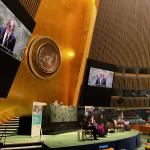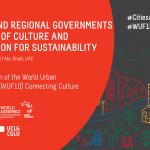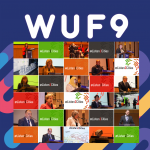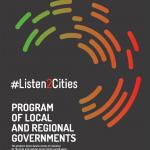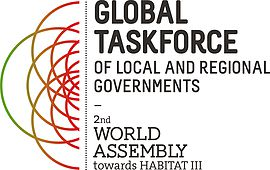
The latest draft of the New Urban Agenda reveals that the voices of cities and territories are having an impact, but Habitat III must go further if it is not to be a missed opportunity to harness urbanization for sustainable development.
In May of 2016, coinciding with the Habitat III Local Authorities Hearings, global networks of local governments, civil society, and the urban community launched the #Listen2Cities campaign to call on national governments and the international community to listen to cities and territories in the negotiations on the New Urban Agenda.
Today we invite these local networks to celebrate their influence on the new draft of the Agenda, released on 18 July, and to continue the social media campaign for states to #Listen2Cities at the Third Preparatory Committee (PrepCom3) in Surabaya, the last major opportunity for us to make our voices heard before the Habitat III Conference in Quito in October.
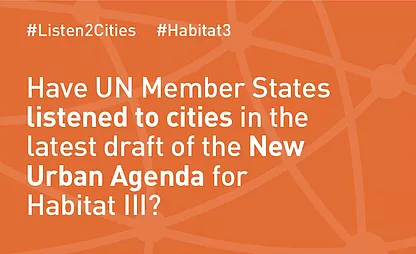
How the New Urban Agenda is listening to cities
In their reaction to the draft of the New Urban Agenda, the networks of the Global Taskforce welcomed the fact that a number of the priorities of cities and territories have been included in the text, particularly:
-
There is increased recognition of the active role that local and regional governments must play in the implementation of the New Urban Agenda.
-
The Agenda has recognized that decisions must be taken as close to citizens as possible, which means giving more powers to local and regional governments.
-
The reference to the Right to the City has been maintained in the latest draft, thanks to the pressure from civil society and local and regional governments. Local and regional governments have taken on the Right to the City as the principle that should guide urban development. Its inclusion in the New Urban Agenda will be an important basis from which to promote the Right to the City in the global agenda going forward. Find out more about the Right to the City and the New Urban Agenda here.
-
The Agenda has explicitly recognized the need to strengthen local and regional governments' capacities in finance, planning, governance, administration and data-management.
-
The Agenda has also called for local and regional governments to play an active role in the follow-up and review of the New Urban Agenda, and for reporting to respond to local and national circumstances, capacities, needs, and priorities.
Why cities and territories must continue to raise our voices
-
The recognition of the World Assembly of Local and Regional Governments as an engagement mechanism is a great step forward. However the New Urban Agenda misses an historic opportunity to include sub-national governments as fully-fledged actors in development policy by giving them a seat at the global decision-making table. Find out more about our recommendations here.
-
The Agenda does not yet address the urban and multi-level governance policies that are necessary for transformational change in a context of rapid urbanization. Habitat III risks being a missed opportunity to harness local governance to create inclusive, democratic, sustainable development for all.
-
The Agenda fails to make strong and deep enough links between Habitat III and the SDGs, particularly SDG 11 on sustainable cities and human settlements. It is essential that the implementation and monitoring of these agendas are linked up on the ground. Find out more about #LocalizingSDGs here.
The Second World Assembly of Local and Regional Governments
Whatever the outcome of Habitat III, local and regional governments will continue to collaborate and bring together our experience to draw up a truly transformative Global Agenda of Local and Regional Governments. We will bring our own Global Agenda to the Second and Third sessions of our Second World Assembly in Bogota and Quito, respectively.
Our Global Agenda will be an agenda by and for cities and territories. It will commit to the Right to the City, put culture at the centre of urban development, prioritize the fight against climate change, and include the best practices on financing, planning and governance from around the world. We hope that our Global Agenda will continue to lead the international conversation and make the bold steps needed by cities and territories around the world.
If you agree that Habitat III should be bolder and #Listen2Cities and territories, join us by tweeting your ideas and resources during PrepCom3 in Surabaya from 25-27 July.
#Listen2Cities on Twitter
Full Global Taskforce reaction to the 18 July Draft of the New Urban Agenda
Surabaya Programme Overview

